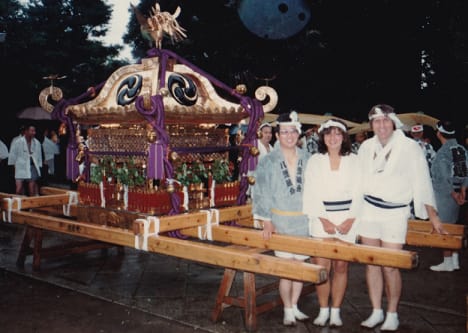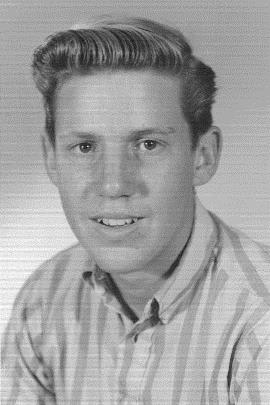Ron-san、以前悔しい思いをしたバンク・オブ・アメリカの採用条件を満たし国際ビジネスのチケットを得るべく大学院に進学するために東京に引っ越し。1977年のお話です。
私はIBMに入社して1年目、ハードディスクの開発に携わっていました。磁気記録はもちろんのこと、ファームウェア、論理回路設計など「意外と」大学での知識が役立ちました。論理回路設計では社内勉強会の講師もしました。
時間とお金をつぎ込んだのが英語。社内の勉強会に加え、横浜元町にあったベルリッツに週2回通いました。また、米国出張には車の免許が必須とのことでしたので、藤沢の自動車学校に通学。貯金はできませんでしたね。でも、自分に投資しないとね。
Graduate school in Tokyo
While in Utsunomiya, I learned of an international graduate business school in English in Tokyo and decided to apply. I think my entrance exam scores were one of the poorest on record, but because they needed students, I was accepted. It was a 3-year MA degree in International Business. So, I was back to school again. If I could get this degree, I will have achieved what was recommended to me in the Bank of America job interview many years earlier to learn a second language and earn a graduate degree to get into international business. I thought that would be my ticket into international business.
渋い赤羽に住み、銭湯通いの日々。近所のちょっとした有名人に。
I got an apartment in Akabane, which is just on the northern tip of Tokyo. That would give me good access to the school as well as enable me to get to Utsunomiya to teach on the weekends.
I got a 2-room apartment, which had no bath. So, I had to use the local Japanese public bath, the “Sento”. Although in recent years they have become rare, public baths were very common, as some houses had no baths. In the evening, a person would take a wash pot, towel, soap, shampoo, change of clothes and go to the public bath. In those days, it cost about 155 yen (about US$1.00 or so) to enter. There were two baths, one for women and one for men. Between the two baths was a wall about eight feet high and a door between the two with a curtain, so you could not see into the other bath. Whole families would go to the bath at once and grandma and grandpa would bath their grandchildren respectively. The younger kids (up to about 5-6) would run between the two baths. The bath really generated a community spirit, as you could talk to the person washing next to you about how your day went, etc. I became famous in Iwabuchi-machi, Akabane, Tokyo very quickly, being a guy from California who could communicate in Japanese. The locals had a lot of questions about me, and I about them. The bath was open from 3:00 PM in the afternoon until mid-night, and I could easily be spotted with my pot on the way to the bath.
Also, I often would telephone a take-out restaurant a block or so away, and did my laundry at the coin laundry right next to the bathhouse. So, I was very visible in the neighborhood. I was there for three years and built a nice community for myself. It is often said that Tokyo is not a large city. It is simply thousands of small villages all packed together. If fully understood what they were referring to. Everything evolved around the bathhouse, coin laundry and a few restaurants or bars. Also, the summer festivals and portable shine celebrations were wonderful and further added to the spirit of the community.

Festivals in Iwabuchi-machi
I decided to try to maintain the working visa by working for an English teaching company full-time and go to school part-time. Then, I could ease my way into the studies without much stress. The company that I worked for sent me to companies all over the Tokyo area to teach their employees English.
私はIBMに入社して1年目、ハードディスクの開発に携わっていました。磁気記録はもちろんのこと、ファームウェア、論理回路設計など「意外と」大学での知識が役立ちました。論理回路設計では社内勉強会の講師もしました。
時間とお金をつぎ込んだのが英語。社内の勉強会に加え、横浜元町にあったベルリッツに週2回通いました。また、米国出張には車の免許が必須とのことでしたので、藤沢の自動車学校に通学。貯金はできませんでしたね。でも、自分に投資しないとね。
Graduate school in Tokyo
While in Utsunomiya, I learned of an international graduate business school in English in Tokyo and decided to apply. I think my entrance exam scores were one of the poorest on record, but because they needed students, I was accepted. It was a 3-year MA degree in International Business. So, I was back to school again. If I could get this degree, I will have achieved what was recommended to me in the Bank of America job interview many years earlier to learn a second language and earn a graduate degree to get into international business. I thought that would be my ticket into international business.
渋い赤羽に住み、銭湯通いの日々。近所のちょっとした有名人に。
I got an apartment in Akabane, which is just on the northern tip of Tokyo. That would give me good access to the school as well as enable me to get to Utsunomiya to teach on the weekends.
I got a 2-room apartment, which had no bath. So, I had to use the local Japanese public bath, the “Sento”. Although in recent years they have become rare, public baths were very common, as some houses had no baths. In the evening, a person would take a wash pot, towel, soap, shampoo, change of clothes and go to the public bath. In those days, it cost about 155 yen (about US$1.00 or so) to enter. There were two baths, one for women and one for men. Between the two baths was a wall about eight feet high and a door between the two with a curtain, so you could not see into the other bath. Whole families would go to the bath at once and grandma and grandpa would bath their grandchildren respectively. The younger kids (up to about 5-6) would run between the two baths. The bath really generated a community spirit, as you could talk to the person washing next to you about how your day went, etc. I became famous in Iwabuchi-machi, Akabane, Tokyo very quickly, being a guy from California who could communicate in Japanese. The locals had a lot of questions about me, and I about them. The bath was open from 3:00 PM in the afternoon until mid-night, and I could easily be spotted with my pot on the way to the bath.
Also, I often would telephone a take-out restaurant a block or so away, and did my laundry at the coin laundry right next to the bathhouse. So, I was very visible in the neighborhood. I was there for three years and built a nice community for myself. It is often said that Tokyo is not a large city. It is simply thousands of small villages all packed together. If fully understood what they were referring to. Everything evolved around the bathhouse, coin laundry and a few restaurants or bars. Also, the summer festivals and portable shine celebrations were wonderful and further added to the spirit of the community.

Festivals in Iwabuchi-machi
I decided to try to maintain the working visa by working for an English teaching company full-time and go to school part-time. Then, I could ease my way into the studies without much stress. The company that I worked for sent me to companies all over the Tokyo area to teach their employees English.





















